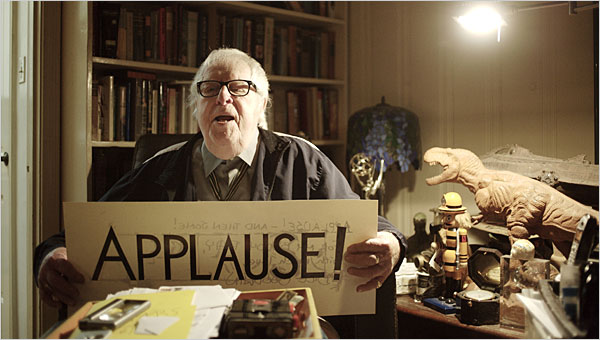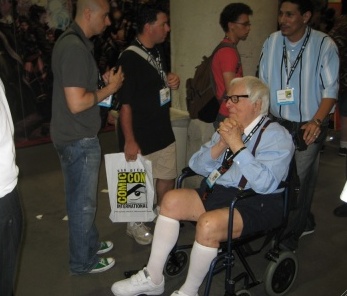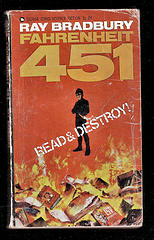Ray Bradbury, the venerable sci-fi titan, and king of all coots turned 90 this week. The guy who started his career with a zine called Futuria Fantasia at age 18 has been enjoying a long overdue renaissance and his birthday is being be marked in Los Angeles with a all kinds of celebrations and tributes. Besides his books, and the fact that he is a crusader for libraries from his wheelchair, the thing I love about this guy is that – like old coots everywhere – he speaks passionately and ridiculously on a variety of wacky subjects, railing against big government and technology. He is really pissed off at President Obama right now. Not for the economy or the wars. It’s his space policy he takes umbrage with. He angrily laments the abandonment of future Moon missions with typical verbosity and outrage:
“He should be announcing that we should go back to the moon. We should never have left there. We should go to the moon and prepare a base to fire a rocket off to Mars and then go to Mars and colonize Mars. Then when we do that, we will live forever.”
He doesn’t “believe in” college, since all the learning you need is on hand for free at the public library.
“Libraries raised me. I don’t believe in colleges and universities. I believe in libraries because most students don’t have any money. When I graduated from high school, it was during the Depression and we had no money. I couldn’t go to college, so I went to the library three days a week for 10 years, I read everything in the library. I read everything. I took out 10 books a week so I had a couple of hundred books a year I read, on literature, poetry, plays, and I read all the great short stories, hundreds of them. I graduated from the library when I was 28 years old. That library educated me, not the college.”
Naturally he rails against technology; “we have too many cellphones. We’ve got too many Internets. We have got to get rid of those machines. We have too many machines now.†He reserves his most fiery condemnation for the aforementioned “internets” and those ubiquitous e-readers:
“Yahoo called me eight weeks ago. They wanted to put a book of mine on Yahoo! You know what I told them? ‘To hell with you. To hell with you and to hell with the Internet.’  It’s meaningless; it’s not real. It’s in the air somewhere. I was approached three times during the last year by Internet companies wanting to put my books on an electronic reading device. I said to Yahoo, ‘Prick up your ears and go to hell.”
And he is library crazed. He continues his lifelong crusade to save and promote public libraries threatened with closures due to cuts in public funding despite his age and state of relative immobility. He has spoken at every one of California’s 200-odd libraries, about which he has said:
“I have a wheelchair, so they carry me to the car, and they throw me in the car, and throw me in the library, and they sell books and they keep all the money. I talk free, to make money for them so they can continue. All libraries are special.”
If there is one thing I’ve learned in life it is to never sell an old coot short. Ray Bradbury wrote one of the greatest and most defining books of the 20th century. He wrote “Fahrenheit 451″, his most famous novel,  in 1953 on a pay typewriter in the basement of the UCLA library. Named for the temperature at which paper ignites, the novel depicts – with shocking depth and foresight - a near-future society in which firemen don’t put out fires, they burn books, and the state suppresses learning. The complacent and unfeeling populace, numbed by nonstop television (television is “family,” a mind-numbing repetitious sitcom of bland characters), happily embrace enforced ignorance. Ray Bradbury predicted a time when humans would be so dumbed down by media and mind-fucked by their totalitarian government, that the only way to keep books alive was to memorize them, to learn them by heart. The half brain-dead citizenry rots in a media-saturated coma of indifference. Readers are shipped to asylums for the criminally insane. The story’s most crushing revelation comes when we learn that censorship is not at the hands of the oppressors at all, but merely the exploitation of the whim of an unfeeling people. Government didn’t impose book burning, it simply institutionalized the people’s will. Ray Bradbury was giving voice to his own fears, that an unrelenting onslaught of mindless media would replace recreational free thinking, and warns of the dire implications of lack of free free thought, predicting a “burgeoning empire of leisure”.
This was 43 years before the launch of the Fox News Network.
“There are worse crimes than burning books. One of them is not reading them”.




